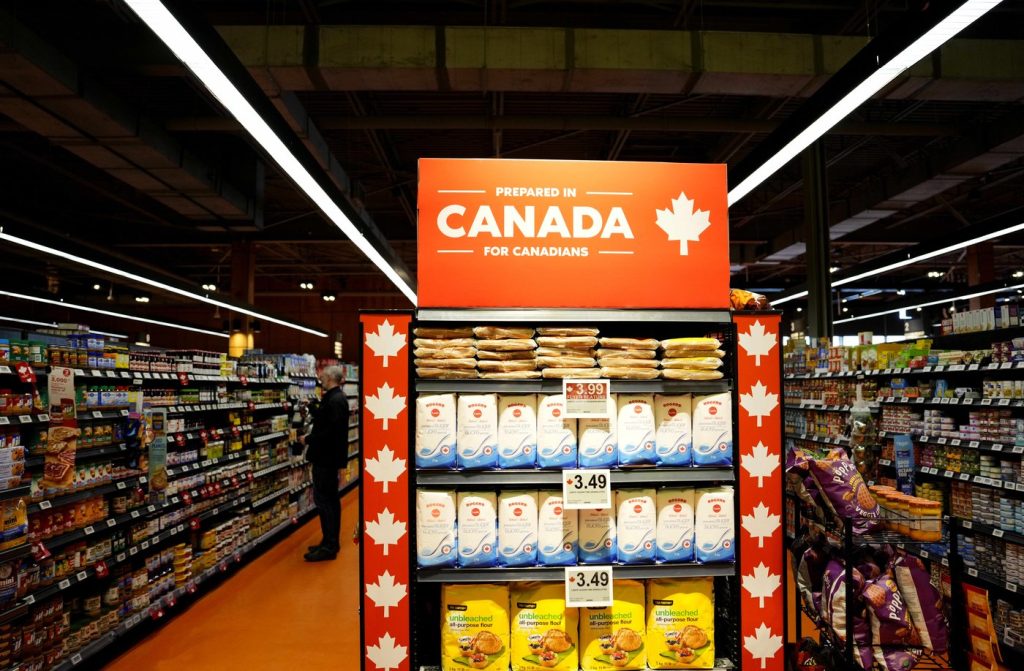The ongoing trade war between Canada and the U.S. has significantly influenced consumer behavior in grocery stores across Canada. In response to economic pressures and political rhetoric, many Canadians are adjusting their shopping habits by adopting a "Canada first" approach, which includes prioritizing Canadian-made products over U.S. brands.
According to NielsenIQ, a March survey revealed that approximately one-third of respondents are actively boycotting U.S.-made products, irrespective of their availability or price. Additionally, a survey conducted by Spring Financial indicated that 80% of Canadians are consciously choosing to buy more Canadian-made items. This shift is largely motivated by recent comments from former U.S. President Donald Trump regarding Canada's autonomy, which many Canadians perceive as a direct threat.
Individuals like Tova Larsen, a resident of Ottawa, express that Trump’s comments about Canada becoming the “51st state” have deeply resonated with them, creating a sense of urgency and existential concern regarding the country's identity. Some Canadians are also expressing heightened awareness regarding food safety, especially in light of budget cuts to the Food and Drug Administration in the U.S.
Others, like Alex Burton from Vancouver, have altered their purchasing choices out of principle. Previously inclined to select U.S. products for their proximity and environmental benefits, Burton now favors imports from places like New Zealand over American options. Similarly, Irene Carroll from Toronto has begun to scrutinize product origins more closely, noticing that her shopping decisions have changed since the onset of tariffs. She finds herself exploring new favorite local products as a result.
For some consumers, embracing Canadian goods means stepping back from cross-border shopping, a common practice in regions like Niagara Falls. Stephen Liard, who previously benefitted from his proximity to the U.S. border, has decided to abandon cross-border trips after feeling disrespected by Trump's remarks. He acknowledges missing certain American products, but emphasizes a commitment to supporting Canadian businesses instead.
Donna Jenkins, originally from Georgia but a long-time Canadian resident, shares that her loyalty has shifted to only buying Canadian or Mexican goods, in support of a collaborative stance against American brands. However, shoppers express some ambiguity about purchasing items made in Canada by American companies, with many feeling that this still supports Canadian jobs and the economy. Carroll and Jenkins articulate a common sentiment: if a product employs Canadians, they will buy it.
Confusion occasionally arises from varying product labels, such as "Product of Canada," "Made in Canada," and less specific terms like "Proudly Canadian." Some shoppers, including Jean-Francois Denault from Montreal, have turned to social media groups for clarity on local product recommendations and find community support in their shopping endeavors.
While many Canadians are enthusiastic about supporting local industries, they acknowledge that opting for Canadian products often leads to higher grocery bills. Irene Larsen notes that her cat's new Canadian diet has become 25% to 30% more expensive, an observation echoed by Burton, who accepts the increased costs as a matter of principle to support the domestic economy. Liard shares this sentiment, stating that while he may spend a bit more on groceries, he is unwilling to support American businesses at the expense of Canadian ones.
Amid these changes, the collective experiences of Canadians indicate a lasting impact on the Canada-U.S. dynamic. Burton believes that regardless of future U.S. trade policies, this period will imprint a lasting sentiment among a generation of Canadians, affecting their purchasing behaviors moving forward.
Commentators have noted a new sense of community among shoppers, as individuals engage in conversations related to product origins in store aisles and checkout lines. Liard remarks on the cooperative mentality emerging among local shoppers, where discussions about Canadian and foreign products are becoming commonplace. This communal approach reinforces a shared commitment to supporting the Canadian economy amidst a backdrop of uncertainty in Canada-U.S. relations.











